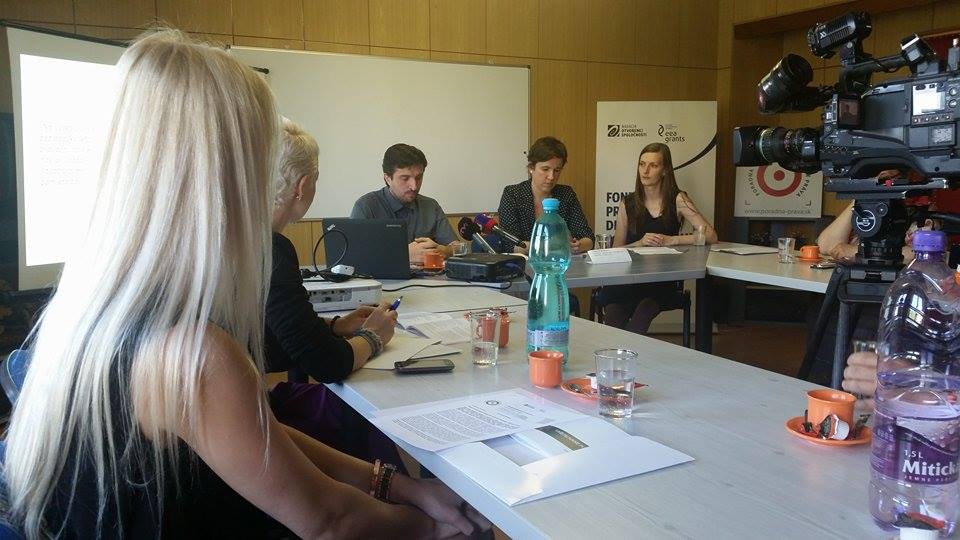Inspection of the Ministry of the Interior does not solve police violence, shows report by Poradňa
EEA, EHP, Fond pre MVO
The investigation of police attacks against the inhabitants of settlements is failing. The Civic and Human Rights Advisory Centre based in Košice points that out in their recent critical report entitled Investigation of Police Violence in Slovakia.
“We have repeatedly come across serious shortcomings related to the quality of the investigation lead by inspectors. Yet the investigation of police violence incidents is bound with strict requirements stemming from international agreements on human rights. However, based on our experience, inspectors tend to ignore that, ” said Štefan Ivanco from the Advisory Centre at a press conference.
Together with Vanda Durbáková, they have been working in the field and monitoring cases of police officers beating Roma since 2009.
Their findings show that the inspection of the Ministry of the Interior does not sufficiently examine claims of physical and psychological torture of police officers against Roma.
According to Ivanco, the reasons are related to the effort to make one’s job easier, prejudice of certain investigators towards Roma and insufficient experience with investigation of such serious cases.
Slovakia has been a target of criticism of international institutions for not examining complaints of police aggression in a sufficient way.

The most serious case was a police raid in Moldava nad Bodvou two years ago, which left dozens of people injured. The police officers from Košice did not find anyone during the controversial search operation. The Minister of the Interior Robert Kaliňák claimed it was standard procedure, the General Prosecution has still not managed to solve the incident.
Baton and kick wounds were also left on Roma after raids in Vrbnica, a village near Michalovce, and in the villages of Stráne pod Tatrami and Huncovce.
Lawyers from the Advisory Centre warn of an alarming fact. Last year alone, the inspection rejected almost 90% of claims of police violence without initiating prosecution. The information was found in statistics and data of the Ministry of the Interior itself.
“They had a tendency to take the side of the suspected police officers rather than the complainants,” said Durbáková.
According to the data obtained by the activists, there are 250 people working in the ministerial inspection and 40 of them are inspectors.
The Ministry lead by Robert Kaliňák refused to provide the Advisory Centre with professional resumes of the inspection managers and they also refused to issue anonymised inspectors’ decisions in the closed cases of police violence.
Kaliňák protested against putting Roma from Moldava nad Bodvou on the same level as police officers.
The Civic and Human Rights Advisory Centre has drawn attention to the inactivity of ministerial inspectors during the investigation of potential racial motives. In recent years, the Advisory Centre pointed to potential police violence against Roma men and women living in Eastern Slovakia.
“The inspectors usually do not pay sufficient attention to potential racial motives of violent actions of police officers and do not investigate them thoroughly. And yet the requirements on racial motive investigation are very strict in such cases. As the Court in Strasbourg mentioned several times in their resolutions, any sign of racial intolerance potentially playing a role in police violence must lead to a thorough racial motive investigation,” explained Durbáková.

The Advisory Centre has also been actively criticizing the inactivity of inspectors in investigating potential racial motives. “Any sign of racial intolerance potentially playing a role in police violence must lead to a thorough racial motive investigation,” stressed Durbáková.
The separation of the inspection from the Ministry of the Interior has been called for by the Ombudsman Jana Dubovcová and the Government Plenipotentiary for Roma Communities, Peter Pollák. The Minister of the Interior, Robert Kaliňák, refuses such steps.
Critical Report 2014 was supported by the Open Society Foundation from the EEA Financial Mechanism 2009 – 2014 within the project Strengthening Institutional Protection and Improving Access to Justice in Cases of Police Violence in Slovakia.
The whole report is available online.
Author: Rudolf Sivý 6.07.2015


